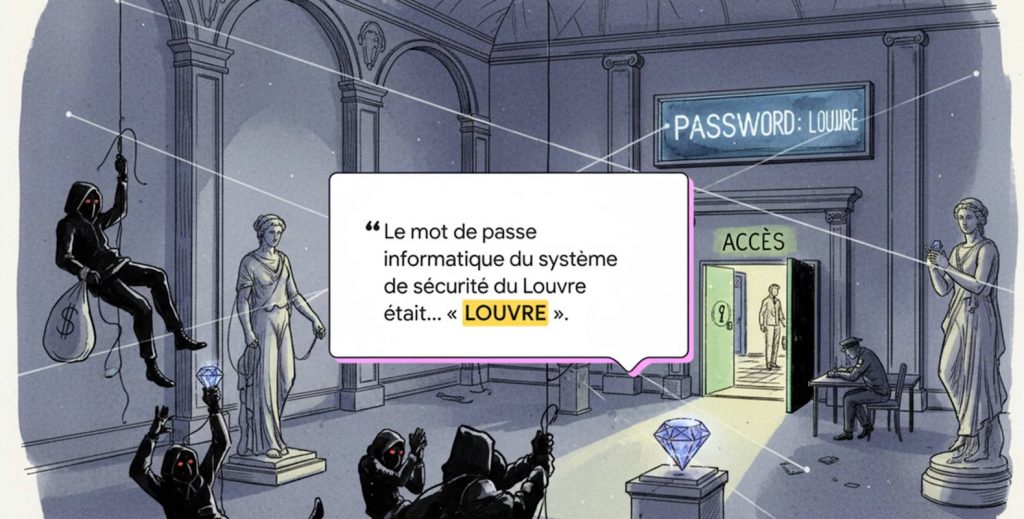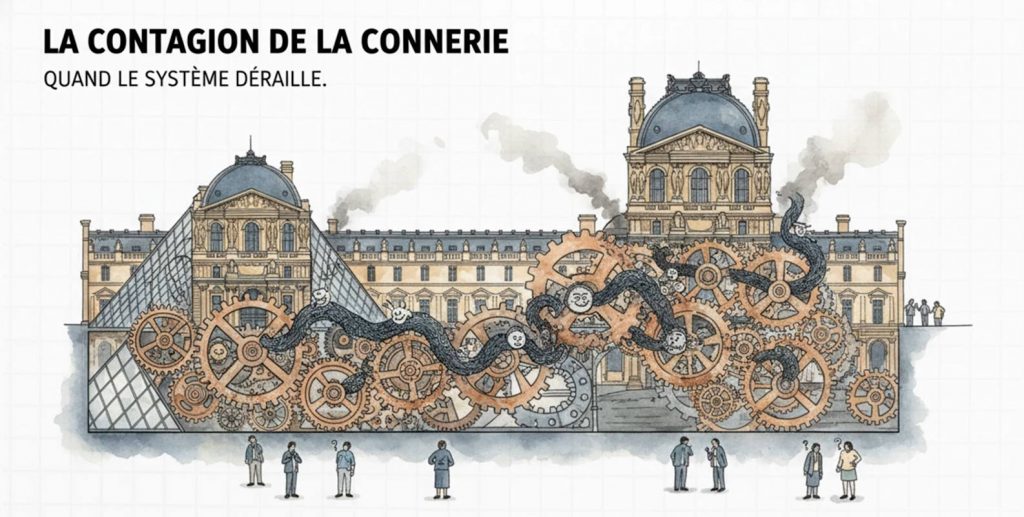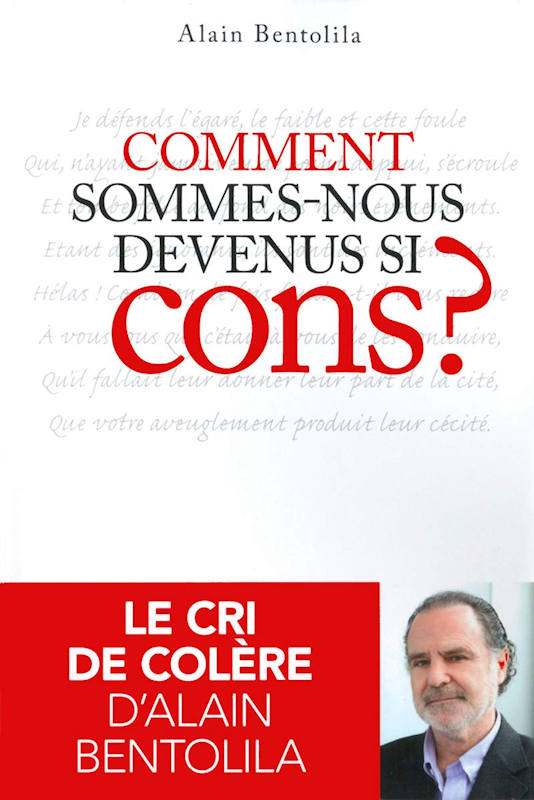If all the idiots flew in formation, the saying goes, not a single plane could take off. But after the wild theft of Empress Joséphine’s jewels at the Louvre, it’s clear they’ve found a prime landing spot: one of the world’s most prestigious museums.[1] And here, my friends, we’re no longer dealing with a simple joke (our apologies to our neighbors, who must be having a good laugh at our expense right now). We’re facing a textbook case that deserves to be studied in every academy of human stupidity. If only Courteline and Michel Audiard were still here…
When the Louvre Becomes the Stage for a National Farce
Table of Contents
by Joël-François Dumont — Paris, November 7, 2025
Professor Alain Bauer, an eminent security specialist, will need to add a substantial chapter to his work “The Dumbest Criminals in History.”[2]


But this time, it’s not the thieves who take the prize – these bunglers simply took advantage of an opportunity. No, the real achievement belongs to those who were supposed to protect the national heritage. Because when you learn that the Louvre’s IT password was… “LOUVRE,” you don’t know whether to laugh or cry.[3] It was so outrageous that many thought it was a hoax. Alas, reality exceeded the most grotesque fiction.
Stupidity as a System: Maxime Rovère’s Analysis


To understand what happened, we need to turn to philosopher Maxime Rovere and his brilliant essay “What to Do with Idiots?”[4] Rovere explains that stupidity isn’t simply a lack of intelligence, but a genuine system into which we all fall. “The problem isn’t stupidity, it’s the idiots,”[4] he writes with disarming clarity. And he adds this crucial observation: “Idiots don’t leave us alone, and they particularly burden those who would like to live far from them.”[4]

At the Louvre, we witnessed the perfect implementation of this system. Because stupidity, Rovere tells us, has an essential property: it’s contagious. “The more you know and feel that the idiot is an idiot, the more you lose your power of benevolence, the further you move from your own human ideal, and the more you transform yourself… into an idiot.”[4] That’s exactly what happened: a chain of diluted responsibilities, where everyone probably thought someone else would take care of the problem. The IT manager who chose “LOUVRE” as a password wasn’t working alone in his corner – he was part of a system where mediocrity had settled in comfortably, like a cat on a radiator.
The Stubbornness of Idiots: A Historical Engine
Rovère warns us: “Idiots are stubborn.”[4] And that’s where all the difficulty lies. Because stupidity isn’t a residue that could be eliminated with a good sweep. On the contrary, it’s “one of the main engines of History, a force that – despite or rather thanks to its blindness – has won a large part of past struggles and will win many in the future.”[4]

At the Louvre, this stubbornness took the form of an accumulation of negligence. Each revelation brings its share of astonishment: the ridiculous password was just the cherry on an already very indigestible cake.[3] Dysfunctions had been piling up for years, with everyone probably finding it normal to do nothing as long as nothing serious happened. Until that Sunday morning when criminals, probably as surprised as they were delighted, discovered they could help themselves like in a self-service store.
Becoming Less Stupid: The Delval Method Applied to Institutions
Quentin Delval, in his work published by the aptly named “Hors d’atteinte” editions, proposes a pragmatic approach: “How to Become Less Stupid in Ten Steps.”[5] His first lesson could be applied directly to the Louvre case: recognize that you have a problem. Because that’s where the shoe pinches. How many meetings, reports, and alerts were necessary before realizing that something was wrong?


Delval insists on a crucial point: male stupidity (since he addresses mainly men) is characterized by a refusal to admit one’s flaws. “Being a man also and above all means being detached from one’s emotions and sensitivity,”[5] he writes. Transposed to the institutional level, this creates organizations where no one wants to be the one who sounds the alarm, where one prefers to maintain a facade of competence rather than admit that one no longer controls the situation.
The password “LOUVRE” isn’t a simple technical error. It’s the symptom of an organizational culture where people pretend everything is fine, where responsibilities are dodged, where one says “I was just about to take care of it” without ever taking action. Delval perfectly describes this mechanism: “I drag my feet on tasks […] Tension rises […] Instead of accepting the conflict that would allow us to get out of the situation, I admit everything and promise that it will change.”[5] Replace “I” with “the institution” and you have the exact portrait of what happened at the Louvre.
France, World Champion of Stupidity?
Alain Bentolila, in his essay with the provocative title “How Did We Become So Stupid?”, points to a collective drift.[6] “From lies to manipulations, from complacencies to cowardices, our collective intelligence is falling apart day by day,”[6] he writes. And he adds this chilling observation: “We became stupid because we gave up cultivating our common intelligence like one cultivates a field to feed one’s own.”[6]


The Louvre case perfectly illustrates this decay. How can a country that prides itself on being the homeland of the Enlightenment, which possesses one of the world’s richest cultural heritages, come to this? The answer lies in generalized complacency. Bentolila speaks of our “fear of looking further than ourselves,” of our renunciation of “transmitting to our children, through the example of the battles we will have fought for truth and beauty, the desire to build a better world.”[6]
At the Louvre, no one wanted to look beyond the tip of their nose. Everyone was content to do their little job, without worrying about overall coherence. The result? Security worthy of a 1970s provincial museum, in an establishment that welcomes millions of visitors and houses priceless treasures.
The Vicious Circle of Institutional Mediocrity
Rovere warns us against what he calls “quicksand”: the more you struggle against stupidity, the deeper you sink into it. “It’s structurally impossible to be a simple witness to stupidity,”[4] he writes. At the Louvre, each actor who noticed a dysfunction probably told themselves: “It’s not my problem,” “Someone else will take care of it,” or worse, “If I say something, I’ll turn everyone against me.”
This attitude creates what Rovere calls a “system”: a setup where stupidity feeds on itself, where each individual cowardice reinforces collective mediocrity. And the philosopher concludes: “You’re not the teacher of idiots. Change situations, not people.”[4] In other words, it’s not by pointing fingers at those responsible that we’ll solve the problem, but by radically transforming the system that allowed this catastrophe.
Humor as the Last Rampart
Faced with this debacle, humor becomes our only weapon. Because as Rovere says, stupidity hurts us, and this wound upsets us.[4]
Laughter allows us to regain control, to escape the “vicious circle” where anger at idiots transforms us into idiots ourselves. The French, champions of sarcasm, immediately reacted on social media with delightful creativity. Some proposed other equally secure passwords: “MUSEUM,” “PARIS,” or even “PASSWORD.” Others suggested renaming the Louvre the “National Sieve.”
But behind the laughter, there’s real suffering. Le Figaro devoted three entire pages to the dysfunctions, and each day brings its share of new revelations.[3]
France feels “offended and ridiculed,” and rightly so. Because what happened at the Louvre isn’t a simple news item, it’s the symptom of a deep evil that’s eating away at our institutions.
Conclusion: Toward a Collective Awakening?
So, are the French stupider than others? The question is poorly posed. As Rovere reminds us, “you’re always someone’s idiot.”[4] But what distinguishes nations isn’t the absence of idiots – they exist everywhere – it’s the ability to prevent them from causing harm. And on this point, we must acknowledge that we failed spectacularly.
The Louvre scandal should be an opportunity for a national shock. Not just to improve museum security, but to fundamentally rethink our relationship with excellence, responsibility, and standards. Bentolila reminds us that “transmitting isn’t spreading apparently infinite knowledge […] Transmitting means sorting, selecting what we want to keep to act better, to understand better.”[6]
It’s time to sort things out. To select what we want to keep from our cultural and institutional heritage, and to have the courage to throw away the rest. Because if we continue down this slope, the Nobel Prize for Stupidity will soon no longer be enough: we’ll need to create an entire academy.
In the meantime, if you’re looking for a secure password, avoid “LOUVRE.” Try “I’mAnIdiot123!” instead – at least that would be honest.
Joël-François Dumont
See Also:
- « À quand un Prix Nobel de la connerie ? » — (2025-1107)
- « When Will There Be a Nobel Prize for Stupidity? » — (2025-1107)
- « Wann gibt es endlich einen Nobelpreis für Dummheit? » — (2025-1107)
Sources and References
[1] Information regarding the theft of Empress Joséphine’s jewels at the Louvre Museum, an event widely reported in the French press.
[2] Bauer, Alain, Les criminels les plus cons de l’histoire (The Dumbest Criminals in History), Éditions First, 2020.
[3] Le Figaro, article devoted to dysfunctions at the Louvre and revelation of the password “LOUVRE” used by the museum’s IT department (November 7, 2025).
[4] Rovère, Maxime, Que faire des cons ? Pour ne pas en rester un soi-même (What to Do with Idiots? To Avoid Remaining One Yourself), Éditions Flammarion, Paris, 2019, ISBN: 978-2-0814-5207-7.
[5] Delval, Quentin, Comment devenir moins con en dix étapes (How to Become Less Stupid in Ten Steps), Éditions Hors d’atteinte, 2023.
[6] Bentolila, Alain, Comment sommes-nous devenus si cons ? (How Did We Become So Stupid?), Éditions First, a division of Édi8, 2014, ISBN: 978-2-7540-7032-4.
In-Depth Analysis:
The Louvre heist isn’t just a simple burglary case, it’s glaring proof that French institutional stupidity has reached heights worthy of a Nobel Prize. When the password for the world’s most prestigious museum’s computer system is… “LOUVRE,” you don’t know whether to laugh or cry. Through the biting analyses of three philosophers – Maxime Rovère, Quentin Delval, and Alain Bentolila – this text dissects how mediocrity has comfortably settled into our institutions, how stupidity has become contagious, and why nobody wanted to sound the alarm. Between salvaging sarcasm and muscular intellectual analysis, discover how France, homeland of the Enlightenment, ended up protecting its national treasures with the security of a 1970s provincial museum. Because sometimes reality exceeds the most grotesque fiction, and it’s time to escape the collective trap of complacency before it’s too late.











